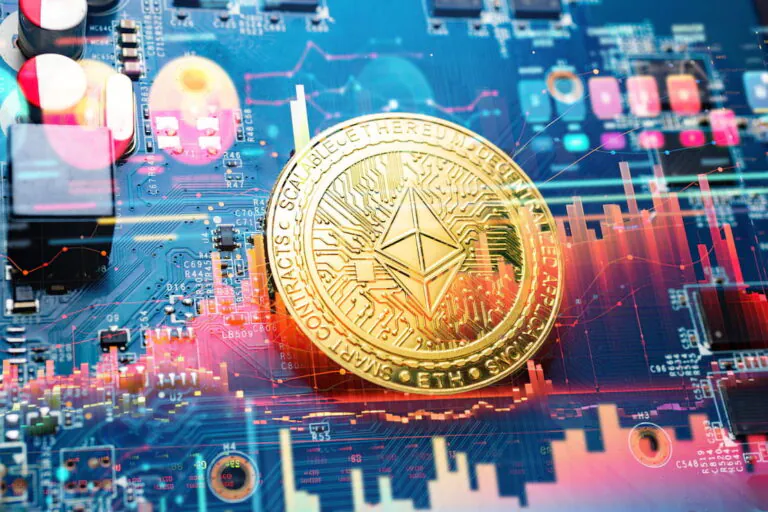Dogecoin (DOGE) with the image of a Shiba Inu dog called Kabosu as its logo, is one of the most popular and successful memecoins. It is considered an altcoin and was launched in December 2013.

The Most Successful Blockchain Projects
Blockchain — What is This?
Blockchain represents an incomparable technological revolution that is rewriting the rules of data storage and security. Its roots are in the idea of a decentralized database, which provides a new paradigm in information management, distinct from legacy centralized systems.
The essence of blockchain is to create a continuous chain of blocks, where each block stores not only data, but also information about the previous block, forming a stable and immutable structure. This connection between blocks is ensured by cryptographic hash codes, making data manipulation virtually impossible.
As one of the most famous blockchain applications, the Bitcoin cryptocurrency stands out for its ability to record and store all financial transactions on a public and independent platform. However, blockchain reveals its potential not only in the field of cryptocurrencies.
It is widely used in supply chain management, where it provides continuous traceability of products and reduces the possibility of counterfeiting. Blockchain-based voting ensures the reliability and authenticity of results, which can increase trust in political processes.
Thus, blockchain is not just a technology, it is a catalyst for changing the way we interact with data and other participants, providing us with more reliable and sustainable solutions in many areas of our lives.
As a result, blockchain technology is a technological advancement that changes the way we store data and brings transparency, decentralization and reliability to various areas of human activity.
Blockchain and Investments
Investing in blockchain and other similar opportunities represents a completely new era in the world of financial solutions and assets. Blockchain, as an innovative technology, has changed our understanding of how to store and transfer data and value online. In this new paradigm, decentralization and cryptographic security have become key aspects.
Investing in cryptocurrencies, as the most visible aspect of blockchain, provides investors with the opportunity to diversify their portfolio and earn potentially high returns. Bitcoin and Ethereum, the two most famous cryptocurrencies, have become objects of interest not only for individual investors, but also for institutional players, highlighting the growing importance of this market.
Beyond cryptocurrencies, investors can also find opportunities in startups developing innovative blockchain-based projects. These could be projects in the field of decentralized finance (DeFi), digital artificial intelligence (AI), Internet of things (IoT), and many other sectors. Investing in startups provides investors with ample opportunities for growth and long-term profit.
Additionally, investors can use financial instruments such as cryptocurrency funds and exchange-traded funds (ETFs) to gain exposure to cryptocurrencies and blockchain technology without having to manage them directly. This provides a more traditional way of investing.
However, despite all the prospects associated with blockchain, it is worth remembering that the cryptocurrency market and investments in startups can be very risky and volatile. Investors should exercise caution, conduct careful analysis and diversify their investments to balance risks and expectations.
How are Blockchain and Crypto Related?
Blockchain and cryptocurrency represent two integral components in the evolution of finance and technology, forming a unique symbiosis of innovation and digital assets. Blockchain is not just a technology, but a fundamental principle on which the future is built. It is based on the concept of a decentralized and distributed database, where information is recorded in blocks and combined into a continuous chain. Each block stores data about the previous block, ensuring that it cannot be changed without changing the entire chain. This provides a high level of security and transparency.
Cryptocurrency, on the other hand, is an electronic asset that has the technology of using cryptography to maintain security and control over the process of creating new units. It operates on the basis of blockchain and serves as a means of exchange and accumulation of value. For example, Bitcoin, the most famous cryptocurrency, uses blockchain to record and store all transactions on a decentralized network.
The connection between blockchain and cryptocurrency is inextricable. Blockchain is the basis for the existence and functioning of cryptocurrencies, ensuring the safety and reliability of transactions, and allowing users to carry out financial transactions without intermediaries such as banks or governments. This leads to cost reduction and increased autonomy.
Blockchain and cryptocurrency are also driving innovation in various fields. For example, smart contracts based on blockchain technology allow the creation of automated and decentralized systems for managing contracts and agreements.
Thus, blockchain cryptocurrencies are not just changing the way we think about financial transactions and data storage, they are acting as a driving force for new economic and technological models, rewriting the rules of the game in the world of finance and innovation.
The Most Popular Blockchain Projects
Ethereum (ETH)
Ethereum stands out not only as a blockchain, but also as a powerful protocol that runs numerous DApps and independent blockchains.
Introduced in 2013, Ethereum was the first decentralized blockchain platform that revolutionized the functionality of smart contracts, ensuring reliable and uninterrupted operations. Its token, Ether (ETH), currently ranks second in market capitalization of all cryptocurrencies, behind only Bitcoin. At the moment, the blockchain operates on a Proof-of-Work (PoW) mechanism, which limits its scalability, but a transition to a Proof-of-Stake mechanism is planned.
Ethereum provides a number of token standards, including ERC-20 for DeFi applications, ERC-721 and ERC-1155 for NFT projects, and ERC-777 for advanced functionality.
Currently, Ethereum hosts more than 450 thousand token contracts based on the ERC-20 standard. Among them are leading crypto projects such as Chainlink (LINK), Basic Attention Token (BAT), Tether (USDT), USD Coin (USDC) and others.
Binance Smart Chain
Binance Smart Chain (BSC) is an innovative blockchain platform designed to execute smart contracts. Its launch moment came at the end of August 2020, and it was intended as a complement to Binance Chain, which appeared in April 2020 with the goal of enabling decentralized trading.
Binance Chain was originally the first blockchain created by the Binance team, and it ran on a PoS consensus mechanism. Despite its speed in processing decentralized transactions, it lacked smart contract functionality and high programming flexibility.
To overcome these limitations, the Binance Smart Chain (BSC) was born, operating in parallel with the original Binance network. BSC has successfully integrated the capabilities of smart contracts and provided compatibility with the Ethereum Virtual Machine (EVM). Transaction processing time on BSC takes only about three seconds, making this platform incredibly fast and efficient. The main token for both Binance Chain and Binance Smart Chain is BNB
Ripple (XRP)
Ripple is an innovative digital payment network and system based on blockchain and backed by the unique XRP token. One of Ripple's key advantages is its efficiency: transactions on its network consume much less energy than the Bitcoin network, and they are confirmed in just a few seconds, while keeping transaction costs extremely low.
This outstanding efficiency makes Ripple an ideal tool for instant and cost-effective money transfers between different currencies, be it regular dollars, euros, yen or other cryptocurrencies such as Litecoin or Bitcoin. XRP, Ripple's token, plays an important role in facilitating quick conversions between a variety of currencies.
However, in addition to its high efficiency, Ripple is also famous for its reliability and ability to scale. Once considered second only to Bitcoin, the network is built on principles that ensure it is reliable and future-ready.
Avalanche (AVAX)
Avalanche — is a revolutionary blockchain platform that surprises with a unique combination of scalability and instant transaction confirmation, thanks to the implementation of the Avalanche consensus protocol. This blockchain relies on a Proof-of-Stake (PoS) mechanism and is capable of processing an astonishing 4,500 transactions per second (TPS), which surpasses the capabilities of Ethereum, which is limited to just 14 TPS.
The native AVAX token serves a dual role on the network: it serves as a strong security and the primary medium of exchange in the Avalanche DeFi ecosystem. Using AVAX as the primary currency to charge fees, incentivize, and implement various use cases ensures high efficiency across the entire ecosystem.
Avalanche is designed to solve many of the problems that other blockchain networks face. Its incredible performance and low gas fees make the token an attractive choice for developers looking for more efficient alternatives to Ethereum.
Tezos
With similar concepts in mind, Tezos and Ethereum represent two decentralized blockchain platforms designed to run smart contracts. However, despite some similarities, they have significant differences that make each of them unique.
The most notable aspect of Tezos is its potential for faster development, especially compared to Ethereum 2.0, thanks to its use of the Proof-of-Stake (PoS) mechanism. Another key advantage of Tezos is the ability to update the network without the need for hard forks.
One of the significant achievements of Tezos is the recent update called Delphi, which resulted in a 75% reduction in the cost of transaction fees (gas). Given that gas fees on Ethereum can reach $50-$100 or more, Tezos is becoming an attractive choice for developers, which contributes to its popularity in the cryptocurrency market.
In conclusion, Tezos is a stable network where decentralization and reliability play an important role, which gives it its uniqueness and makes it a well-deserved alternative to Ethereum.
Cardano (ADA)
Cardano, developed by Charles Hoskins, one of the co-founders of Ethereum, shares many similarities with this popular platform.
The most important difference between Cardano and Ethereum is that Cardano is already successfully operating on a Proof-of-Stake (PoS) mechanism, while Ethereum is still preparing to switch from Proof-of-Work (PoW) to PoS. This gives Cardano a significant speed advantage and is considered a greener blockchain platform.
The latest significant update to the Alonzo hard fork added the ability for developers to create and deploy their own smart contracts on Cardano, significantly expanding the functionality of the platform.
Cardano's benefits lie in its focus on improving the transaction process using the ADA cryptocurrency and providing developers with convenient tools for creating smart contracts. These characteristics make Cardano an interesting alternative to Ethereum and give it its own uniqueness in the world of blockchain technologies.
Bottom Line
Today's world is on the verge of a technological revolution, and one of the brightest stars of this era is certainly blockchain technology. Among the many blockchains existing in the world, the presented list represents the most relevant and important platforms at this time. Let's return to their meaning in the moment.
Blockchain technology has revolutionized the way we keep records, exchange information, and even transfer value. Its key feature is decentralization, which makes it possible to bypass traditional centralized systems and enhances data transparency and reliability. This creates the basis for a variety of applications and solutions in various industries, including finance, healthcare, logistics, government and many others.
Cryptocurrencies blockchain technologies play an important role in the spread of this technology and give it additional relevance. They provide a new way to conduct financial transactions, ensuring security and anonymity when making transactions. Thanks to these characteristics, cryptocurrencies have become incredibly popular and continue to gain momentum.
With the development of technology and the improvement of blockchains, cryptocurrencies are becoming more accessible and convenient for use in everyday life. This popularity and relevance of blockchains and cryptocurrencies is due to their ability to transform traditional ways of working and provide innovative solutions to many problems.
In conclusion, it should be emphasized that blockchain technologies and cryptocurrencies will continue to remain relevant and popular in the coming years, and their influence on the global economy and society will only grow. These innovations have undoubtedly changed our world, and their future promises even more exciting opportunities and developments.
Start your crypto exchange with Coin24

Exchange BTC, ETH, USDT and more — cash or card

Secure and fast crypto exchange since 2018



